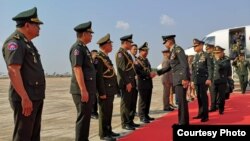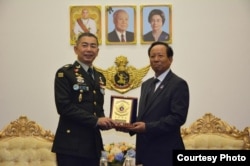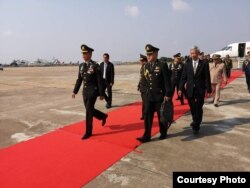Thailand’s newly appointed army chief Apirat Kongsompong visited Cambodia this week to discuss border security issues and expanding military ties.
Apirat, an upstart figure of Thailand’s royalist-military establishment after his appointment as army chief in September, arrived on Tuesday and met with his Cambodian counterpart, Cambodian army commander Hun Manet, as well as Defense Minister Tea Banh.
Banh said on Wednesday that the Apirat held technical discussions with Cambodian officials on the issues of border security and military ties between Cambodia and Thailand.
“It’s normal that we meet and discuss a number of issues, in which we made mutual assurances to strengthen the existing good cooperation with a more consensus-based and sweetened military arrangement along the border,” Banh told VOA Khmer in a phone call on Wednesday.
The visit took place as Thailand is gearing up for much-awaited first post-coup election in March, and after reports that Cambodia issued former Thai prime minister Yingluck Shinawatra with a diplomatic passport.
The Cambodian government denied that the fugitive politician was issued a Cambodian passport, but later called for a national review of foreigners holding diplomatic passports, which are often issued to government advisers.
Banh said the area around the Preah Vihear temple, where both countries engaged in armed clashes between 2008 and 2011, remained at peace.
“There’s no problem out there. The thing is that both sides understand each other better and we now have no problem. We can talk to each other more effectively. now do not have a problem any longer.”
Coming from the influential King’s Guard army division, Apirat has been seen as an upstart figure among Thailand’s ruling establishment since his appointment as the nation’s infantry commander in September.
Besides assuming command of the army, Apirat is also a member of the Crown Property Bureau – a body overseeing the Thai royal fortune, estimated at least $30 billion – and the secretary-general of the National Council for Peace and Order (NCPO), the junta governing Thailand since the 2014 coup.
Thailand will hold a much-awaited election on March 24 in a return to the civilian rule that critics have seen as aimed at empowering the NCPO’s roles in the post-election political sphere.
Apirat caused uproar recently by suggesting he may lead a coup if a return to civilian rule would “create chaos” in the country.
Paul Chambers, a defense analyst with Thailand’s Naresuan University, said the visit by Apirat would help to ensure the Thai military’s relations with Hun Sen government, deter a reincarnation of Phnom Penh’s alliance with opposition forces, and embed bilateral defense ties.
Whichever party wins the election in March will continue to maintain positive relations with Cambodia, he said.
“However, if a pro-Thaksin [Shinawatra] party wins the election, it may happen that anti-Thaksin Thais or Thai military elements will accuse the new pro-Thaksin government of getting too close to Hun Sen. Such accusations would simply be political rhetoric designed to sway Thai public opinion against a pro-Thaksin government.”
Banh also expressed his belief that the election in Thailand would not disrupt bilateral ties with Cambodia.
“We encourage a smooth election [in Thailand], hoping that no problems and no clashes will take place in the process,” he said.









